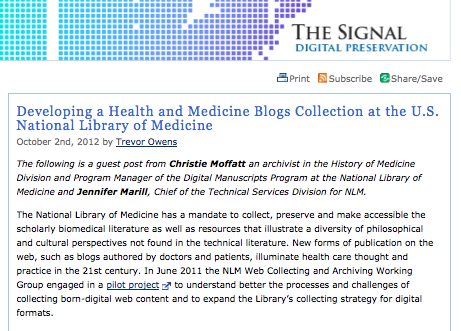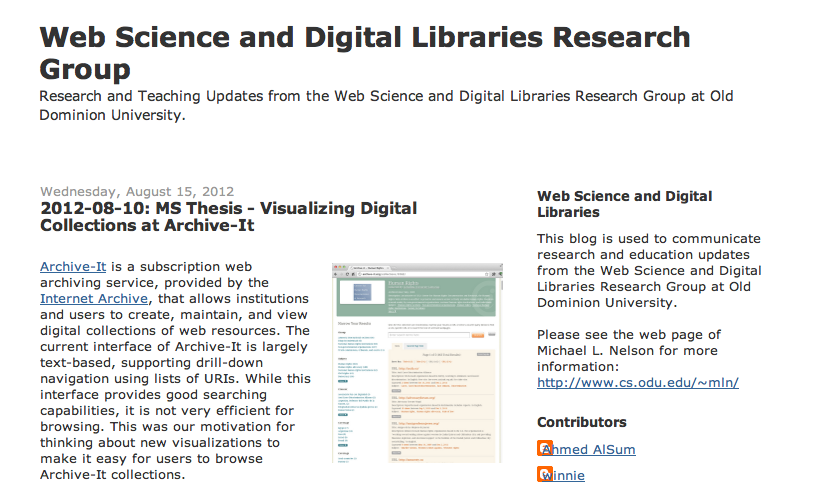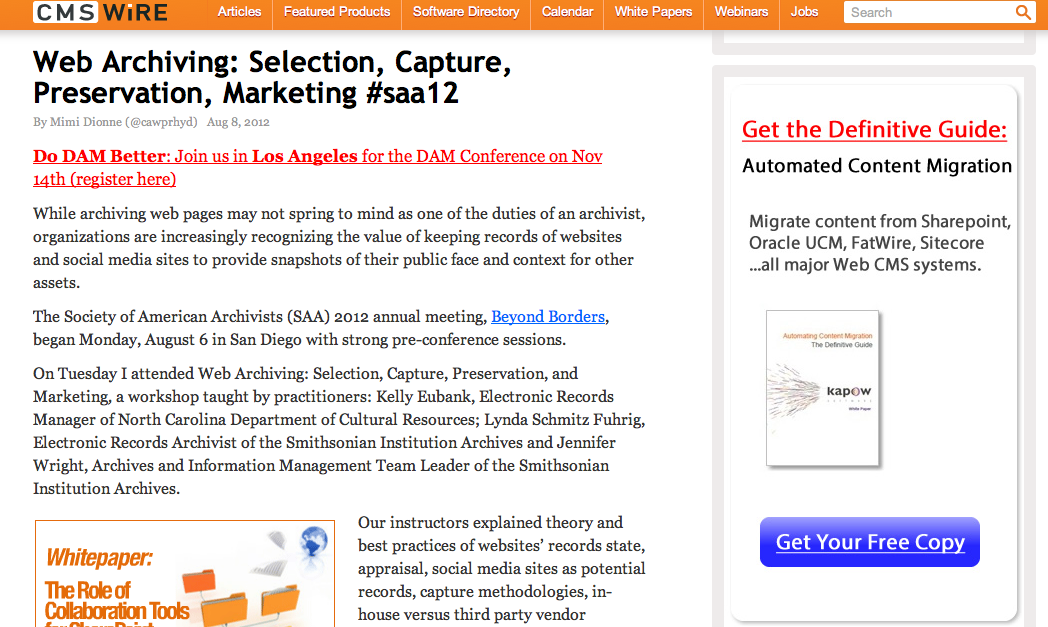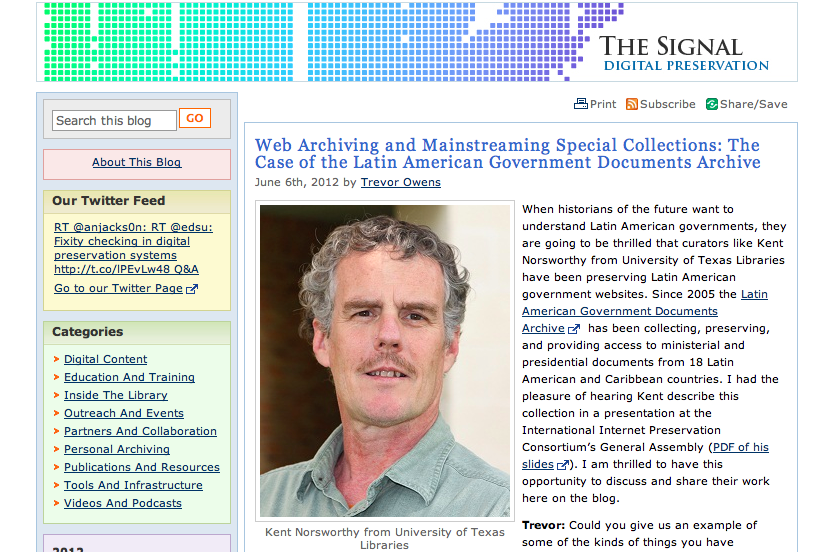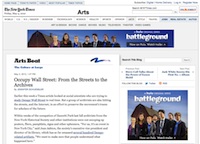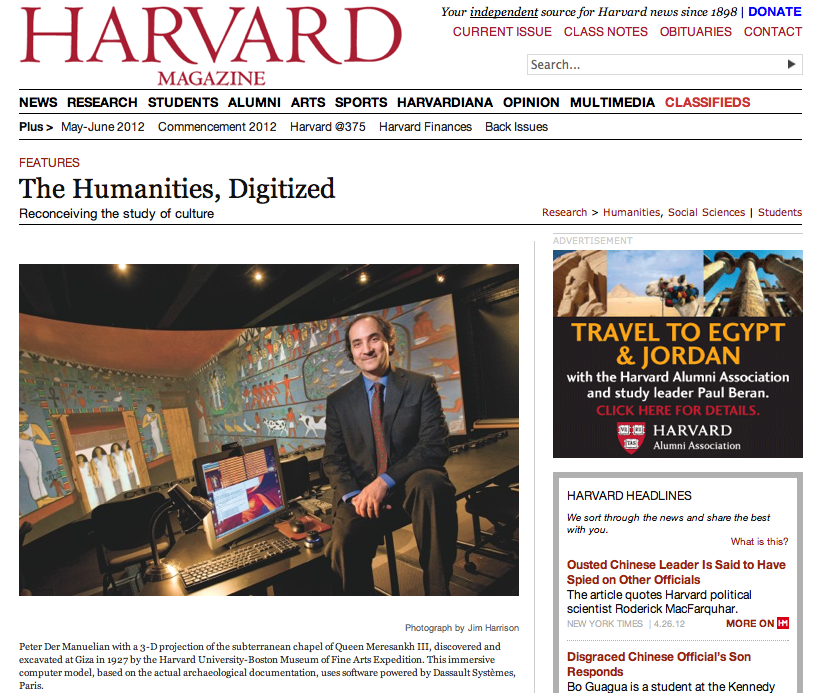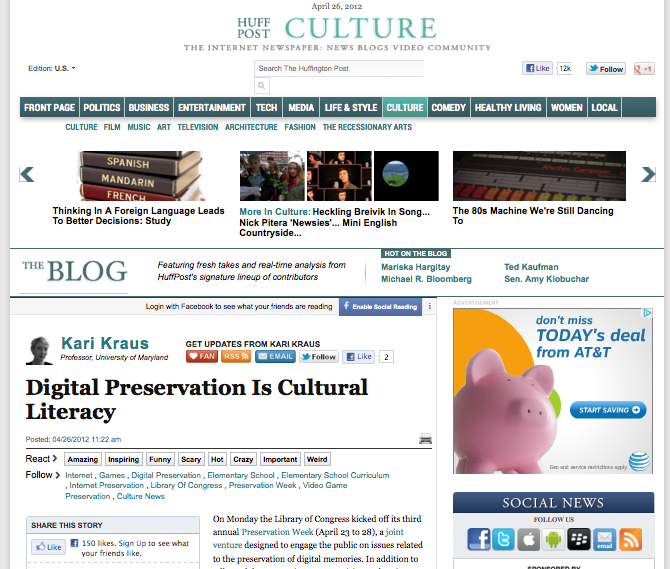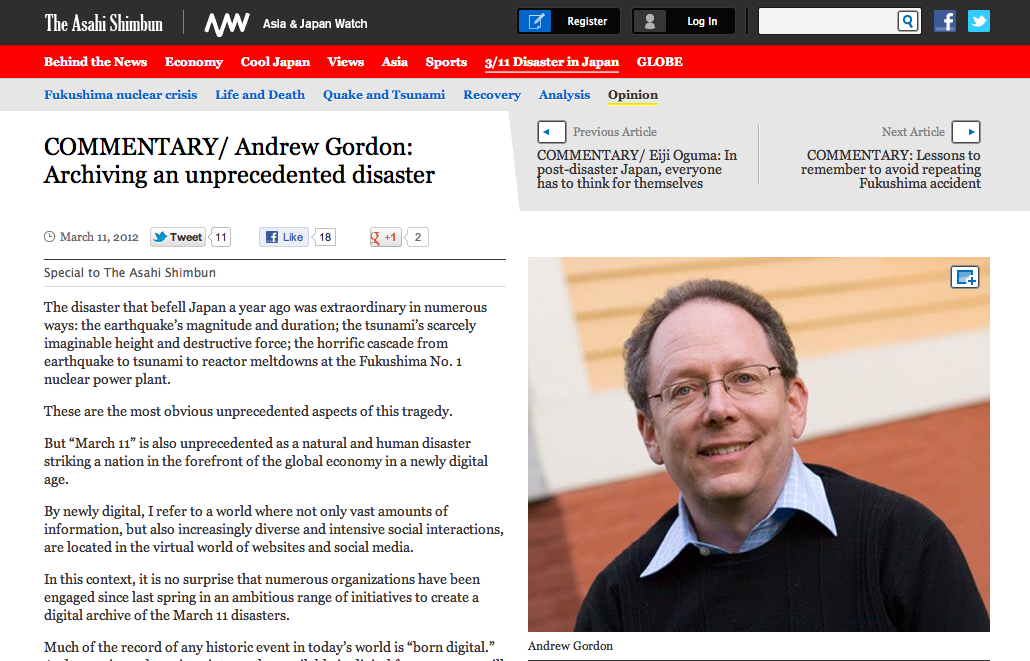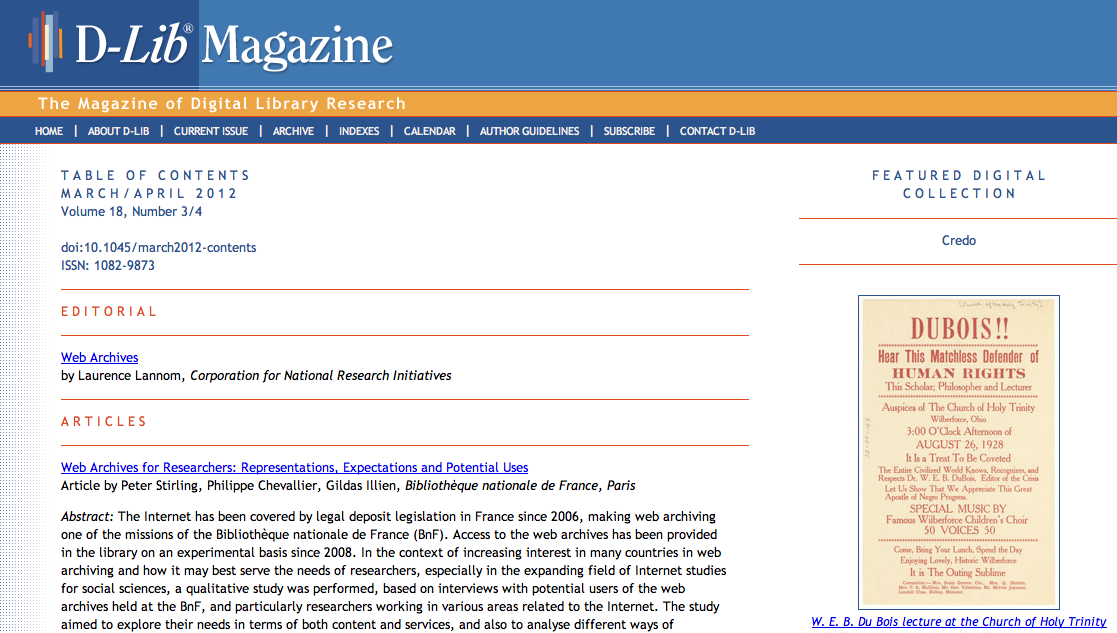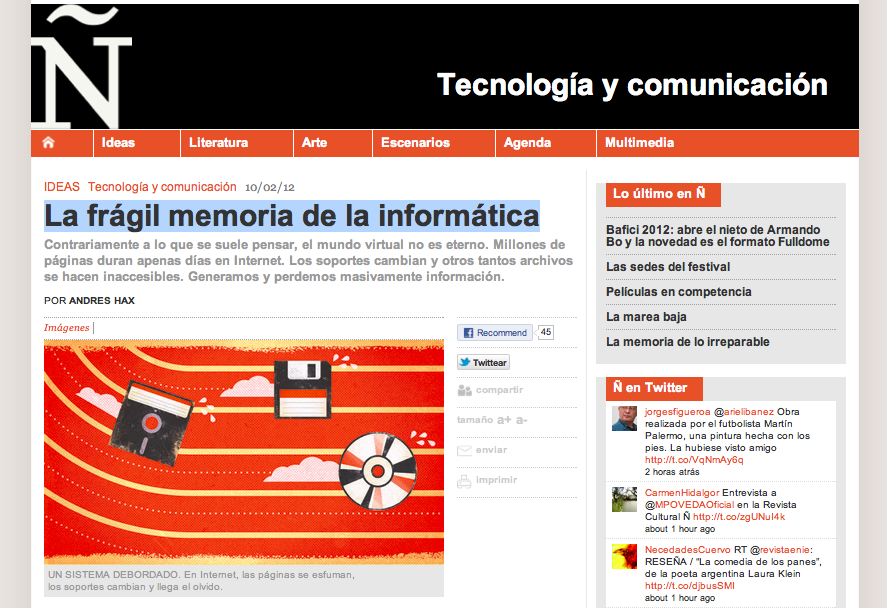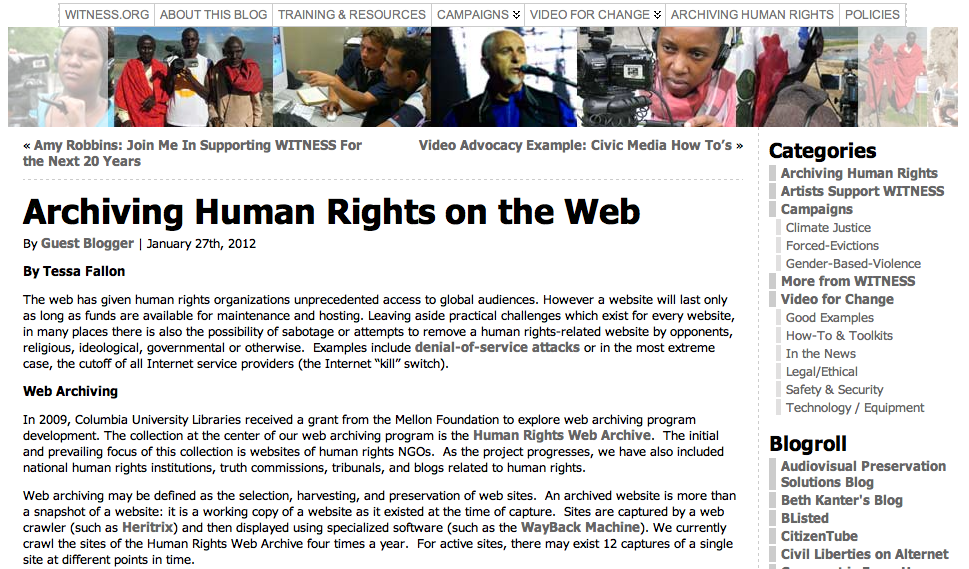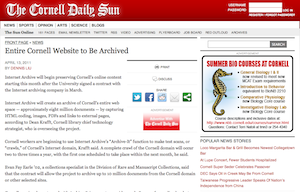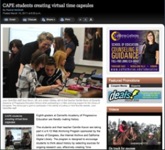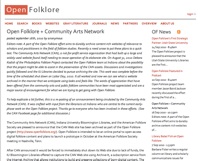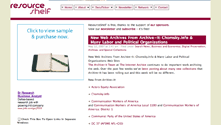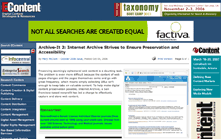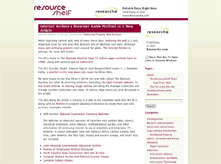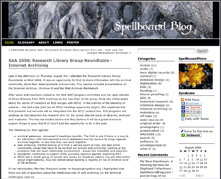Developing a Health and Medicine Blogs Collection at the U.S. National Library of Medicine
"The National Library of Medicine has a mandate to collect, preserve and make accessible the scholarly biomedical literature as well as resources that illustrate a diversity of philosophical and cultural perspectives not found in the technical literature. New forms of publication on the web, such as blogs authored by doctors and patients, illuminate health care thought and practice in the 21st century. In June 2011 the NLM Web Collecting and Archiving Working Group engaged in a pilot project to understand better the processes and challenges of collecting born-digital web content and to expand the Library’s collecting strategy for digital formats."
Learn more ►
-- By Christie Moffatt and Jennifer Marill, The Signal, October 2, 2012
MS Thesis - Visualizing Digital Collections at Archive-It
"Visualizing Digital Collections at Archive-It", was the subject of a recent MS thesis by Kalpesh Padia (who is continuing his Ph.D. studies at NC State University) and a JCDL 2012 short paper by Kalpesh Padia, Yasmin AlNoamany, and Michele C. Weigle.
In order to provide a better visual experience to users of Archive-It collections, we implemented six different visualizations (treemap, time cloud, bubble chart, image plot, timeline, and wordle). The work also provides a rule-based categorization of sites in collections that lack a curator-defined grouping.
Learn more ►
-- August 15, 2012
Web Archiving: Selection, Capture, Preservation, Marketing #saa12
While archiving web pages may not spring to mind as one of the duties of an archivist, organizations are increasingly recognizing the value of keeping records of websites and social media sites to provide snapshots of their public face and context for other assets.
Learn more ►
-- By Mimi Dionne, August 8, 2012
Web Archiving and Mainstreaming Special Collections: The Case of the Latin American Government Documents Archive
When historians of the future want to understand Latin American governments, they are going to be thrilled that curators like Kent Norsworthy from University of Texas Libraries have been preserving Latin American government websites.
Learn more ►
-- By Trevor Owens, The Signal, June 6, 2012
Occupy Wall Street: From the Streets to the Archives
Earlier this week a Times article looked at social scientists who are trying to study Occupy Wall Street in real time. But a group of archivists are also hitting the streets, and the Internet, in an effort to preserve the movement’s traces for scholars of the future.
Learn more ►
-- By Jennifer Schuessler, New York Times Arts Beat Blog, May 2, 2012
The Humanities, Digitized
When the largest tsunami in Japan’s recorded history struck in March 2011, wreaking horrific damage up and down the northeastern coast, Folger Fund professor of history Andrew Gordon recalls that he and other Harvard scholars of Japanese culture “had a sense that this was an event that would probably change people’s sense of time” in Japan. A core group of faculty members also felt obligated to try to capture the ephemeral documentation of the crisis that was appearing on the Internet.
Learn more ►
-- By Jonathan Shaw, Harvard Magazine, May-June 2012
Digital Preservation Is Cultural Literacy
While digital preservation might not be the first thing that comes to mind when thinking about K-12 curricula, in fact teaching kids about Web archiving, digitization, media storage, and collection building can foster long-term thinking and serve as a gateway to hands-on learning in science and technology.
Learn more ►
-- By Kari Kraus, Huffington Post, April 26, 2012
Archiving an unprecedented disaster
There is an urgent need to collect materials for a digital archive of the catastrophe triggered by the Great East Japan Earthquake, especially because digital resources are uniquely impermanent.
Learn more ►
-- By Andrew Gordon, Asahi Shimbun, March 11, 2012
D-Lib Magazine
A focus on web archiving in the March issue of D-Lib Magazine.
Learn more ►
-- March, 2012
La frágil memoria de la informática
An article on preserving digital information from the Argentinian newspaper Clarin
Learn more ►
-- By Andres Hax, Clarin, February 10, 2012
Archiving Human Rights
In 2009, Columbia University Libraries received a grant from the Mellon Foundation to explore web archiving program development. The collection at the center of our web archiving program is the Human Rights Web Archive. Why are we doing this? In brief, to preserve online resources for future researchers and activists. Archiving the sites of human rights organizations ensures, to a certain degree, that the website content will be preserved in the context of the original site, and will be accessible even if the original site becomes unavailable.
Learn more ►
-- By Tessa Fallon, Witness Blog, January 27, 2012
Entire Cornell Website to be Archived
Internet Archive will create an archive of Cornell’s entire web space — approximately eight million documents — by capturing HTML coding, images, PDFs and links to external pages, according to Dean Krafft, Cornell library chief technology strategist, who is overseeing the project.
Learn more ►
-- By Dennis Liu, The Cornell Daily Sun, April 13, 2011
CAPE Students Creating Virtual Time Capsules
Eighth-graders at Camarillo Academy of Progressive Education are literally making history. The students and their teacher Camille Kavon are taking part in a K-12 Web Archiving Program sponsored by the Library of Congress, the Internet Archive and California Digital Library. The program is designed to encourage students to think about history by selecting sources for ongoing research use, effectively creating "time capsules" of what represents their current lives.
Learn more ►
-- By Rachel McGrath, Ventura County Star, March 10, 2011
AUC Rare Books and Special Collections Library News
Interested in learning more about the events of January 25th? Explore the resources described below to discover more about demonstrations in Egypt.
Learn more ►
-- American University in Cairo Rare Books and Special Collections Library, February 27, 2011
Open Folklore + Community Arts Network
The Community Arts Network (CAN), Indiana University Bloomington Libraries, and the American Folklore Society are pleased to announce that the CAN Web site has been archived as part of the Open Folklore project. After CAN announced it would be forced to immediately shut down its Web site due to lack of funds, the IU Bloomington Libraries offered to capture the CAN Web site using Archive-It.
Learn more ►
-- Open Folklore, September 16, 2010
Archive-It Tuned Into Customers
Kristine Hanna, the director of web archiving services at the Internet Archive, has no illusions about the nature of web content. "One of our favorite expressions is, 'the web is a mess,'" she laughed. "It truly is, and it's not getting any better. We have these librarians and archivists who are interested in highly curated collections of born-digital content. So, the question is, how do we get from 'the web is a mess' to highly curated collections?"
Learn more ►
-- Library of Congress Digital Preservation Program News, July 26, 2010
NASA Archiving Social Networking Activity
NASA has partnered with online subscription service Archive-It to store all of the space agency's social media activity and make it accessible from one central location.
Learn more ►
-- By Elizabeth Montalbano, InformationWeek, March 30, 2010
Archiving NASA’s Social Media
One thing NASA is careful about is archiving material. They are well aware of the importance of the work they’re doing, and public outreach is a critical aspect of it. That’s why I’m happy to see a new effort on the part of the space agency to archive all their social media outlets.
Learn more ►
-- By Phil Plait, Discover Magazine, March 21, 2010
Sherwood middle school students participate in nationwide program to archive Web sites
Sherwood middle school students are creating a 21st century version of a time capsule, though there won't be any shovels or digging involved.
Learn more ►
-- By Melissa Navas, The Oregonian, February 24, 2010
Long–term Preservation for fragile Web content: LANIC’s Web archiving Program
In this article, Archive-It partner, Kent Norsworthy, talks about how the Latin American Network Information Center at UT Austin uses Archive-It to archive government documents from Latin America, as well as why web archiving is so important for this type of content. The article was published in the 2008-2009 "Portal"(http://lanic.utexas.edu/project/etext/llilas/portal/portal099/), a magazine published annually
since 2006 by the Teresa Lozano Long Institute of Latin American
Studies at The University of Texas at Austin.
Learn more ►
-- By Kent Norsworthy, Portal, October 29, 2009
Web archiving from a kid's point of view
"Could 22nd-century researchers think of the Captain Underpants Web site as source material? They might if kids taking part in the K-12 Web Archiving Program decide they want to preserve it for future generations."
Learn more ►
-- By Lauren Barack, School Library Journal, August 31, 2009
K12 Web Archiving: "I had never thought of archiving websites..."
"Student comments [about the web archiving program] included 'choosing the websites was really fun because it let everyone be creative and really think about what teenagers enjoy today,' and 'I had never thought of archiving websites, even though in this day and age we use them as much as and more than books.'"
Learn more ►
-- Library of Congress, August 5, 2009
Moran students chronicle their 'worlds' online
"Most of the decisions being made about what gets archived have been made by adults," said Cheryl Lederle, educational resources specialist at the Library of Congress. "Student users are arguably one of the largest users of the Internet proportionately, and their voices weren't being heard."
Learn more ►
-- By Samaia Hernandez, The Record Journal, April 2, 2009
Archive-It Adds Advanced Search Interface
"Unlike another IA project, The Wayback Machine, Archive-It pages can be keyword searched. The service uses Nutch open source search software."
Learn more ►
-- Resource Shelf, December 27, 2007
Archiving the Volunteer State Web: Archive-It and The Tennessee State Library and Archives
"The Internet Archive’s Archive-It service continues to debut new permanent archival collections of web pages and sites. Here are a few new ones since we posted our last update. This time the collections all began with the help of the Tennessee State Library and Archives. Here are a few of the many Tennessee collections."
Learn more ►
-- Resource Shelf, August 17, 2007
Pact to Ensure Uninterrupted Research Access
"The DOE E-print Network is the largest collection that a federal institution has undertaken in an on-going effort to preserve their own documents and history through Archive-It."
Learn more ►
-- Office of Scientific and Technical Information (OSTI), June 29, 2007
New Web Archives From Archive-It: Chomsky.Info & Many Labor and Political Organizations
"The Archive-It Team at The Internet Archive continues to do important work archiving the web. Over the past few weeks we’ve been posting about many new collections that Archive-It has been rolling out and this week will be no different."
Learn more ►
-- Resource Shelf, May 12, 2007
Archive-It 2: Internet Archive Strives to Ensure Preservation and Accessibility
"The Internet Archive's universal approach to the dissemination and access of information is embodied in its Archive-It service that anybody or any organization can use."
Learn more ►
-- By Marji McClure, EContent, October 5, 2006
Internet Archive's Brewster Kahle Profiled in a New Article
"While digitizing content gets tons of press these days, archiving the web is a very important issue for info pros that deserves lots of attention and work. Although many web archiving projects exist around the globe, The Internet Archive is perhaps the most well known."
Learn more ►
-- Resource Shelf, June 22, 2006
Preserving the Web one group at a time
"Subscribers can develop digital collections of their own based on up to 300 "seed" Web sites designated by the institution. The annual service lets subscribers create and manage up to three collections, with as many as 10,000,000 URLs."
Learn more ►
-- By Stefanie Olsen, CNet News, May 1, 2006
SAA 2006: Research Library Group Roundtable – Internet Archiving
"Archive-It puts the tools for managing larges scale web crawling in the hands of archivists."
Learn more ►
-- By Jeanne Kramer-Smyth, Spellbound Blog, August 27, 2006
Internet Archive Releases Archive-It 1.5
"Collaborating with state archivists as well as public and private libraries, Archive-It is working to preserve information found on the Internet. New features and applications of the Archive It 1.5 release include enhancements to the user interface, improved access to collections, and advanced search and reporting capabilities."
Learn more ►
-- By Michele Manafy, EContent, April 28, 2006
Archiving Made Easier
"The Internet Archive has released new software, called Archive-It 1.5, that lets colleges and museums create their own searchable catalogs of data and multimedia. The software -- available for an annual fee of $10,000 -- allows institutions to manage digital collections comprising as many as 10 million items as part of the archive's main project, a comprehensive online library showing the evolution of every site on the Web. A number of colleges, including the University of Toronto and Indiana University at Bloomington, have signed up for the service, the archive said. "
Learn more ►
-- By Brock Read, Chronicle of Higher Education: The Wired Campus, May 3, 2006
A Permanent Collection for a Digital World
"Students are encouraged to use the online archives, which are free to anyone with an Internet connection. Once on the site, users can choose from the available collections, including one on Hurricane Katrina. After a collection is selected, the site retrieves links, similar to search engine results, to Web sites that have been cached in the archives."
Learn more ►
-- By Lauren Barack, School Library Journal, May 12, 2006
Internet Archive sells extended archiving for organizations
"Archive-It 1.5 provides subscription-based service that allows institutions to store, categorize history (at a lower price) from their website and WWW. Users are able to explore and access these text-searchable collections, without needing additional technical expertise."
Learn more ►
-- By John Batelle, Searchblog, May 2, 2006
Archiving and Preserving the Web: Future Directions and Applications
"Those not able or ready to step up to web archiving on their own (or who might want to get their feet wet slowly) might be interested in taking a look at Archive-It, a new product of the Internet Archive. Archive-It makes it possible, at a fairly modest price, to get started with web archiving without a lot of technical expertise or investment."
Learn more ►
-- By Merrilee Proffitt, Hanging Together, April 29, 2006
Biblog (Denmark)
"Take the tour to see how it works. It is all up-to-date technology, simple and straightforward. And very effective."
<br/>(translation by InterTran, www.trannexp.com).
Learn more ►
-- By Erik Hy, Biblog, April 29, 2006
Internet Archive Launches Archive-It Service
"Internet Archive today announced the latest release of Archive-It 1.5, a new subscription-based archiving service geared towards a broad range of institutions at a cost considerably lower than other archive platforms. Archive-It enables subscribers to capture, categorize, and preserve online material from their own institutions websites as well as from the world wide web. Users are able to access and explore and these text-searchable collections, without needing additional technical expertise."
Learn more ►
-- Brooklyn Library, May 3, 2006
Why Use Archive-It?
The organizations we work with use Archive-It to:
- Support the organization's existing digital preservation activities
- Archive organization and related websites and online publications
- Archive state or local agency websites and records
- Capture elected officials's websites and election events
- Capture publicly available social networking sites: blogs, tweets, photos and comments
- Create a web archive on a specific topic or subject
- Assemble content to aid in research, grant funding, and patron support
- Maintain strong electronic records management system to ensure critical documents are preserved
- Capture "at risk" content on rapidly changing events
- Gather information from the web to enhance traditional collections and exhibits
- Archive artist files, digital collections, online price lists and auction catalogs
- Preservation of law and policy related materials, including Supreme Court activities


